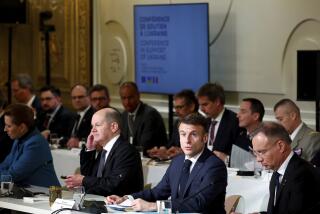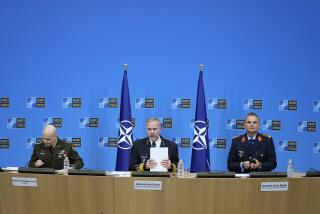NATO Begins Plan to Contain Kosovo Violence
- Share via
LUXEMBOURG — Vowing to avoid the mistakes they made as war erupted in Bosnia, NATO foreign ministers ordered their military commanders Thursday to prepare the alliance’s muscle to prevent the ethnic violence in Yugoslavia’s troubled province of Kosovo from spilling into neighboring countries.
“Nothing has been excluded,” NATO Secretary-General Javier Solana said. “We are asking our military authorities to think about all the possibilities.
“NATO does not want at all that the situation that we lived in 1991 and 1992 will be repeated,” Solana said in reference to the start of Bosnia-Herzegovina’s campaign of “ethnic cleansing.” “We will be prepared . . . to act rapidly.”
The foreign ministers decided against an immediate deployment of fresh NATO troops to Albania and Macedonia, instead calling for expanded cooperation between the North Atlantic Treaty Organization and the endangered neighbors of Kosovo, which is located in Yugoslavia’s Serbian republic.
The foreign ministers created a new joint NATO-Albania headquarters unit in Tirana, the Albanian capital, and endorsed a six-month extension of an international military deployment in Macedonia, which includes about 800 U.S. soldiers. The Macedonia force was established under United Nations auspices.
The call for planning of more drastic measures clearly was intended as a warning to Yugoslav President Slobodan Milosevic, who in February ordered a police crackdown on Kosovo’s ethnic Albanians that so far has cost more then 160 lives. Albanians account for 90% of the 2 million people in the province.
NATO officials say that neither Albania nor Macedonia, which also has a large ethnic Albanian population, are able to control their borders without substantial outside help.
“It is essential that we begin contingency planning for preventive military deployments to [Macedonia] and Albania,” Secretary of State Madeleine Albright said. “The threat of cross-border actions from Kosovo to Albania is real--and another reminder that it is President Milosevic who is internationalizing the conflict.”
Albright and other officials insisted that the use of military force was not automatic and would have to be specifically authorized at a later meeting. However, under NATO procedures, a study like the one ordered Thursday is a necessary prelude to military action.
“We hope that political dialogue will make all these preparations useless,” Solana said. “But we have to be prepared.”
Russian Foreign Minister Yevgeny M. Primakov, who met with NATO ministers in the joint council created to ease Moscow’s objections to NATO expansion into the former Soviet Bloc, said his government opposes deployment of protective forces to Albania and Macedonia without specific approval of the U.N. Security Council. And he pointedly refused to promise that Russia would not veto such a deployment.
A senior U.S. official said later that the United States does not believe that Security Council approval would be needed if NATO decides to act.
U.S. officials said the report on military options for Kosovo should be completed by the end of June. NATO defense ministers are expected to hear an interim report in Brussels in two weeks.
Although the United States has been far in front of most of its allies in calling for action in Kosovo, Albright said she was satisfied by the action of the foreign ministers, which she said sends a clear signal to Milosevic.
More to Read
Sign up for Essential California
The most important California stories and recommendations in your inbox every morning.
You may occasionally receive promotional content from the Los Angeles Times.













